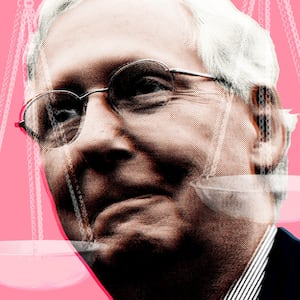After a series of gut-wrenching moments, intense and emotional exchanges, and by far the weirdest hearing I have ever seen on Capitol Hill, Brett Kavanaugh was confirmed as the newest justice of the Supreme Court.
Only that wasn’t the end of the matter. Kavanaugh then went to the White House to partake in a fake swearing-in ceremony that—because Donald Trump has to be Donald Trump—had all the hallmarks of a political rally.
Sitting in the front row at that ceremony, taking it all in, was Senate Majority Leader Mitch McConnell (R-KY), which was appropriate since all of this—the weird hearing, the subtle dismissal of victims of sexual assault, the secrecy around the nominee’s record—was his doing. He is the maestro of moving judicial nominees through the Senate, and Kavanaugh was a prime testament to McConnell’s ruthless, amoral pursuit of that singular mission.
For those who have been in the trenches fighting against McConnell (and I’m one of them, having served as former Senate Majority Leader Harry Reid’s top communications hand), his success is undeniable. Single-minded in his pursuit of political power, imaginative in his choice of tactics, and emotionless to his core, he practiced Obama’s “no drama” mantra years before it became associated with the 44th president. And because of it, our judiciary will bear the imprint of his efforts decades after he leaves office.
But, and this is very important, that won’t be McConnell’s sole or even his most important legacy. Indeed, when history is written on McConnell’s tenure as Republican leader, there will be a more profound and unsettling conclusion: McConnell broke the Senate and hurt the country, and the sad fact is that he couldn’t care less.
This so-called institutionalist who expresses such devotion to the Senate’s traditions and the working people of Kentucky is, on these fronts, a fraud. That McConnell exists only in the imaginations of the reporters that write glowing profiles about the brilliant means and Machiavellian mind-set he employs while giving short shrift to the damaging ends he pursues.
The reality is that for him politics is all about winning. The idea that a leader would work to bridge the differences between the two parties in order to try and improve the country is a foreign concept to him. Everything is a zero-sum game. He is a man of no conviction except for a pursuit of power at all costs.
I had a ringside seat for all of this when I was working in Senator Reid’s office for six years. The economy was in a free fall and millions of Americans were hurting. So what did McConnell do? He used every tool available to him as Republican leader to block Obama’s efforts to address this suffering and indicated his opposition to the newly elected president’s agenda for good measure. It was one thing for him to declare famously that his whole goal was to make sure that Obama was a one-term president (obviously he failed) but it was another thing to watch him try to round up the votes to filibuster virtually every piece of legislation we brought to the floor.
The same pattern was there regarding judges. McConnell’s entire objective was to simply block what Obama or Democrats put forward, especially during Obama’s second term in office. It’s the reason there were so many judicial vacancies available for Trump to fill.
McConnell’s defenders will say that he was just doing what any opposition leader would do in that position. But the truth is, it was not standard fare. And he did it, in part, to ensure his own survival. In 2012, when his leadership position was threatened by an insurgent Tea Party, McConnell capitulated. Rather than questioning some of the movement’s more extreme views, which ran contrary to his public record to that point, he appointed a Ron Paul staffer to run his re-election campaign. It was not a profile in courage.
That was just the first act. For his next one, he cooked up a false argument to keep Judge Merrick Garland, Obama’s pick for the Supreme Court, bottled up in committee, never even giving the president a courtesy of a hearing. He followed that up with his handling of Kavanaugh, which was breathtaking in its audacity: from the shielding of records to the limiting of the scope of the investigation into allegations of sexual assault.
After watching all that, no one should have been surprised to hear McConnell declare this week that despite how he’d bottled up Garland’s nomination, the “standard” set then wouldn’t necessarily apply to Donald Trump. In an all-too-typical display of hypocrisy, McConnell left open the possibility of confirming another Supreme Court justice during the 2020 presidential elections if a vacancy occurred and Republicans still controlled the Senate. McConnell had some ready-made rationalization for why this was within the norms and traditions of the Senate—when, in reality, it was anything but that.
But that’s just McConnell. While he may be imaginative when it comes to using power, he also a leader with little or no concern for the collateral damage his methods inflict on the Senate and our political system.
Henry Clay, whose seat he holds, and who brokered bipartisan deals in hopes of keeping the union together, once observed “the time will come when Winter will ask you what what you were doing all Summer.” I am not sure Clay would approve of how McConnell has used this summer.






